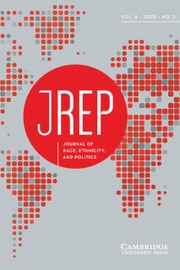Crossref Citations
This article has been cited by the following publications. This list is generated based on data provided by
Crossref.
Filindra, Alexandra
Buyuker, Beyza
and
Kaplan, Noah J.
2021.
Do Perceptions of Ingroup Discrimination Fuel Whites Mistrust in Government? Insights from the 2012-2020 ANES and a Framing Experiment.
SSRN Electronic Journal ,
Nelson, Kjersten
2021.
You seem like a great candidate, but…: race and gender attitudes and the 2020 democratic primary.
The Journal of Race, Ethnicity, and Politics,
Vol. 6,
Issue. 3,
p.
642.
Hero, Rodney E.
and
Levy, Morris
2021.
Unequal values: equality and race in state of the union addresses, 1960–2018.
The Journal of Race, Ethnicity, and Politics,
Vol. 6,
Issue. 3,
p.
499.
Flaherty, Anne F. Boxberger
2021.
“A New and Coherent Strategy?” Presidential attention and rhetoric in the era of Indian self-determination.
The Journal of Race, Ethnicity, and Politics,
Vol. 6,
Issue. 3,
p.
478.
Zhirkov, Kirill
and
Valentino, Nicholas A.
2022.
The Origins and Consequences of Racialized Schemas about U.S. Parties.
The Journal of Race, Ethnicity, and Politics,
Vol. 7,
Issue. 3,
p.
484.
Filindra, Alexandra
and
Fagan, E. J.
2022.
Black, immigrant, or woman? The implicit influence of Kamala Harris’ vice presidential nomination on support for Biden in 2020.
Social Science Quarterly,
Vol. 103,
Issue. 4,
p.
892.
Filindra, Alexandra
Nassar, Rita L.
and
Buyuker, Beyza E.
2022.
The conditional relationship between cultural and economic threats in white Americans’ support for refugee relocation programs.
Social Science Quarterly,
Vol. 103,
Issue. 3,
p.
686.
Buyuker, Beyza
Filindra, Alexandra
Manatschal, Anita
and
Green, Eva
2022.
Ethno-racial Minority Representation and National Majority Members’ Support for Democratic Norms.
SSRN Electronic Journal ,
Filindra, Alexandra
and
Kolbe, Melanie
2022.
Latinx identification with whiteness: What drives it, and what effects does it have on political preferences?.
Social Science Quarterly,
Vol. 103,
Issue. 6,
p.
1424.
Filindra, Alexandra
Kaplan, Noah J.
and
Buyuker, Beyza E.
2022.
Beyond Performance: Racial Prejudice and Whites’ Mistrust of Government.
Political Behavior,
Vol. 44,
Issue. 2,
p.
961.
Aguado, N. Alexander
2022.
When charismatic leadership Trumps social networking: Searching for the effects of social media on beliefs of electoral legitimacy.
Politics & Policy,
Vol. 50,
Issue. 5,
p.
942.
Utych, Stephen M.
Navarre, Rachel
and
Rhodes-Purdy, Matthew
2022.
Fear or Loathing: Affect, Political Economy, and Prejudice.
The Journal of Race, Ethnicity, and Politics,
Vol. 7,
Issue. 3,
p.
505.
Moss, Sigrun Marie
and
Solheim, Marte C. W.
2022.
Shifting Diversity Discourses and New Feeling Rules? The Case of Brexit.
Human Arenas,
Vol. 5,
Issue. 3,
p.
488.
2022.
Filindra, Alexandra
Manning, Andrea
and
Pollert, Isaac
2022.
Beyond Busing: Does I/E Priming Work in Whites’ Support for Spending on Black Schools?.
SSRN Electronic Journal ,
Filindra, Alexandra
Kaplan, Noah J.
and
Manning, Andrea
2023.
Who Buys the “Big Lie”?: White Political Grievance and Confidence in Electoral Outcomes.
SSRN Electronic Journal,
Filindra, Alexandra
Buyuker, Beyza E.
and
Kaplan, Noah J.
2023.
Do Perceptions of Ingroup Discrimination Fuel White Mistrust in Government? Insights from the 2012–2020 ANES and a Framing Experiment.
Polity,
Vol. 55,
Issue. 1,
p.
137.
Paik, Anthony
Pachucki, Mark C.
and
Tu, Hsin Fei
2023.
“Defriending” in a polarized age: Political and racial homophily and tie dissolution.
Social Networks,
Vol. 74,
Issue. ,
p.
31.
Fording, Richard C.
and
Schram, Sanford F.
2023.
Pride or Prejudice? Clarifying the Role of White Racial Identity in Recent Presidential Elections.
Polity,
Vol. 55,
Issue. 1,
p.
106.
Filindra, Alexandra
and
Nassar, Rita
2023.
The Breadwinner and “the Other”: Sexism, Immigrant Economic Threat, and Support for Immigration Restriction in American Public Opinion.
SSRN Electronic Journal,


